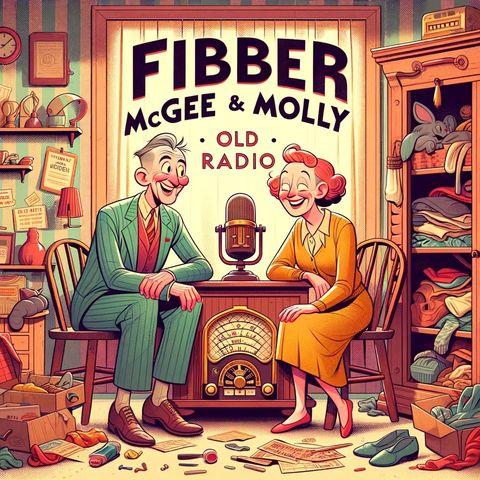Contacts
Info
"Fibber McGee and Molly" OverviewCreators: The show was created and written by Don Quinn and Phil Leslie.Stars: It starred Jim Jordan as Fibber McGee and his real-life wife, Marian Driscoll...
show more- Setting: The show was set in the fictional town of Wistful Vista, where Fibber McGee and his wife, Molly, lived. The comedy derived from the everyday situations and interactions between Fibber, Molly, and a diverse cast of town characters.
- Fibber McGee’s Closet: One of the most famous running gags of the show was Fibber McGee’s closet. Whenever the closet was opened, a huge cascade of items would fall out, symbolizing Fibber’s hoarding and disorganization, much to the amusement of the audience.
- Regular Characters and Catchphrases: The show featured regular characters like Throckmorton P. Gildersleeve, Mayor LaTrivia, and Doc Gamble, each bringing their own quirks to the show. It was also known for its catchy phrases, like Molly's "T'ain't funny, McGee!"
- Structure and Humor: Episodes often revolved around Fibber getting involved in various schemes or misunderstandings, with Molly acting as the more sensible counterbalance. The humor was gentle and character-driven, rooted in the interactions and eccentricities of small-town life.
- Impact and Legacy: "Fibber McGee and Molly" was immensely popular for its warm, humorous look at American life. It influenced numerous other radio shows and was a staple of the Golden Age of Radio. The show’s approach to comedy, character development, and the use of running gags set a standard for sitcoms both in radio and later television.

-
Smackout an episode of Fibber McGee and Molly
22 APR 2024 · Please enjoy Smackout a great episode of the legendaryFibber McGee and Molly - A Classic Old Time radio Show.19m 36s -
Smackout an episode of Fibber McGee and Molly
22 APR 2024 · Please enjoy Smackout a great episode of the legendaryFibber McGee and Molly - A Classic Old Time radio Show.19m 36s -
The Motorcycle Cop an episode of Fibber McGee and Molly
22 APR 2024 · Please enjoy The Motorcycle Cop a great episode of the legendaryFibber McGee and Molly - A Classic Old Time radio Show.28m 51s -
Hot Dogs And A Blowo an episode of Fibber McGee and Molly
22 APR 2024 · Please enjoy Hot Dogs And A Blowo a great episode of the legendaryFibber McGee and Molly - A Classic Old Time radio Show.28m 59s -
House Raffle an episode of Fibber McGee and Molly
22 APR 2024 · Please enjoy House Raffle a great episode of the legendaryFibber McGee and Molly - A Classic Old Time radio Show.30m 13s -
Christmas Shopping an episode of Fibber McGee and Molly
22 APR 2024 · Please enjoy Christmas Shopping a great episode of the legendaryFibber McGee and Molly - A Classic Old Time radio Show.29m 26s -
New Year s Celebrati an episode of Fibber McGee and Molly
22 APR 2024 · Please enjoy New Year s Celebrati a great episode of the legendaryFibber McGee and Molly - A Classic Old Time radio Show.29m 27s -
Encyclopedia Salesma an episode of Fibber McGee and Molly
22 APR 2024 · Please enjoy Encyclopedia Salesma a great episode of the legendaryFibber McGee and Molly - A Classic Old Time radio Show.28m 50s -
Street Car Motorman an episode of Fibber McGee and Molly
22 APR 2024 · Please enjoy Street Car Motorman a great episode of the legendaryFibber McGee and Molly - A Classic Old Time radio Show.23m 59s -
The Haircut an episode of Fibber McGee and Molly
22 APR 2024 · Please enjoy The Haircut a great episode of the legendaryFibber McGee and Molly - A Classic Old Time radio Show.21m 50s
"Fibber McGee and Molly" OverviewCreators: The show was created and written by Don Quinn and Phil Leslie.Stars: It starred Jim Jordan as Fibber McGee and his real-life wife, Marian Driscoll...
show more- Setting: The show was set in the fictional town of Wistful Vista, where Fibber McGee and his wife, Molly, lived. The comedy derived from the everyday situations and interactions between Fibber, Molly, and a diverse cast of town characters.
- Fibber McGee’s Closet: One of the most famous running gags of the show was Fibber McGee’s closet. Whenever the closet was opened, a huge cascade of items would fall out, symbolizing Fibber’s hoarding and disorganization, much to the amusement of the audience.
- Regular Characters and Catchphrases: The show featured regular characters like Throckmorton P. Gildersleeve, Mayor LaTrivia, and Doc Gamble, each bringing their own quirks to the show. It was also known for its catchy phrases, like Molly's "T'ain't funny, McGee!"
- Structure and Humor: Episodes often revolved around Fibber getting involved in various schemes or misunderstandings, with Molly acting as the more sensible counterbalance. The humor was gentle and character-driven, rooted in the interactions and eccentricities of small-town life.
- Impact and Legacy: "Fibber McGee and Molly" was immensely popular for its warm, humorous look at American life. It influenced numerous other radio shows and was a staple of the Golden Age of Radio. The show’s approach to comedy, character development, and the use of running gags set a standard for sitcoms both in radio and later television.
Information
| Author | QP3 |
| Categories | Performing Arts |
| Website | - |
| corboo@mac.com |
Copyright 2024 - Spreaker Inc. an iHeartMedia Company
